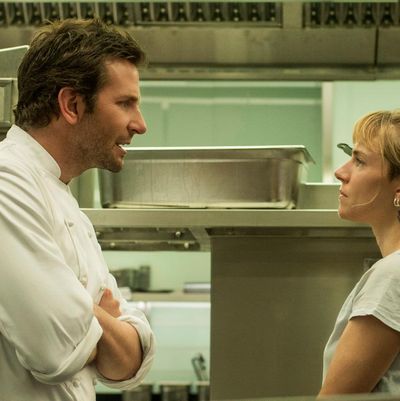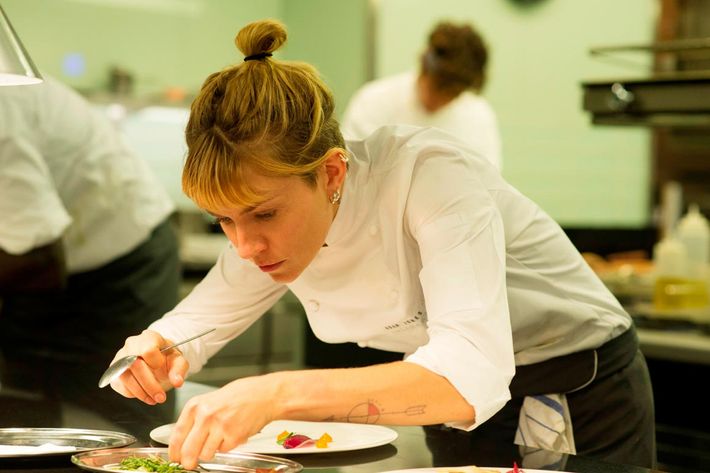
Burnt, the new film starring Bradley Cooper as a talented but troubled chef named Adam Jones, has plenty of problems. Critics have universally panned it, and the film looks like a flop financially, too. But perhaps the most abrasive aspect about this otherwise-mediocre film is its treatment of female characters, whom the film props up, only to brush aside in favor of a tired story about male accomplishment.
In an opening scene, unemployed Adam seeks out London’s most important restaurant critic, played by Uma Thurman: He wants her to visit his former business partner’s fine-dining restaurant, where he knows the food is dismal, so he can swoop in, revamp the menu, and earn three Michelin stars. The two banter, and then, seemingly out of nowhere, Thurman’s character says: “When I lie awake at night and list my regrets, I say to myself, ‘Simone, you’re a lesbian. Why did you sleep with Adam Jones?’” By now, it’s well established that Hollywood journalists are always sleeping with their subjects, but the scene is simply the most obvious way that the film does a unique disservice to females in the restaurant industry.
In fact, all of the women in Burnt are defined by their romantic, or sexual, relationships with Adam. Sienna Miller plays the lone female protagonist, a cook named Helene, whom Adam recruits to be his sous-chef by saying, “We should be dealing in culinary orgasms. When’s the last time you had an orgasm that was interesting?” This kind of overtly sexual line is played in the film as charming, even though the truth is that many female chefs and cooks still must endure exactly this kind of sexist behavior in real-world workplaces. Helene is set up to be this amazingly talented partner for Adam, but her character is reduced to doing the actual cooking while he throws temper tantrums, doting on him when he’s in trouble with drug dealers, and, of course, eventually becoming his love interest.
This is especially disconcerting since, before the film’s release, Miller said the role of Helene appealed to her because “She’s in a male-dominated world, and she has to stand up for herself.” The film rarely gives her character that chance. During a pivotal scene in which Adam is throwing a temper tantrum — as critics have pointed out, it’s often as if Cooper is mimicking Gordon Ramsay — he smashes plates, screams obscenities, and grabs Helene, looking as though he’s about to strike her. He doesn’t, thankfully, but Helene still walks out, seemingly for good. Eventually, after the maître d’ persuades her to come back, she returns to the kitchen, and Adam only asks, “You good?”
There are red flags all over the place here, and the film never truly explains why Helene would return to such an abusive environment. Is it because she loves this particular job so much? Because leaving on bad terms will damage future career prospects? Or is it, more offensively, because there’s some romantic chemistry with Adam?

It’s a shame that the movie couldn’t do more to explore the dynamic of women in the restaurant industry, especially since it’s such a pervasive topic right now. Toronto-based restauranteur Jen Agg recently founded the Kitchen Bitches conference to “address the patriarchy in the world,” and in an op-ed for the New York Times, she wrote, “The high-end restaurant community is small, and word travels fast. And so women stay quiet and adjust themselves to fit into a testosterone-fueled environment, or they leave the business.” This was an opportunity for Burnt to offer smart commentary on this issue, but instead the film (inadvertently) endorses the “deal with it” response to restaurant abuse.
For female chefs, the notion of being tough and cool is still closely tied to “taking it” when men are belligerent. Even the Pixar film Ratatouille — a cartoon about an anthropomorphic cooking rodent — did a better job of exploring this issue than Burnt, when Colette, the lone woman in the movie’s kitchen, says, “High cuisine is an antiquated hierarchy built upon rules written by stupid, old men. Rules designed to make it impossible for women to enter this world. But still I’m here. How did this happen? Because I am the toughest cook in this kitchen!”
Similar to Colette, Helene works tirelessly to perfect her craft, so why doesn’t Burnt show her aspiring to be more than second-in-command? After Adam viciously critiques her turbot, Helene cooks the fish for her daughter every day until she gets it right. This is the one plot point that Burnt almost gets right. Helene, a single mother, works just as hard as Adam but has a young daughter to come home to at the end of the day. She must juggle these immense responsibilities, though they are often at odds with one another, and still, he’s the one who’s allowed to be so tortured and, well, burnt out. If anything, since chefs like Suzanne Goin and Gabrielle Hamilton have said that the ideal way to balance motherhood and chefdom is to own a restaurant, it would make sense for Helene to desire that autonomy.
Throughout the entirety of Burnt, Adam has one driving goal: to earn three Michelin stars. But what about Helene’s ambitions? Why is she so passionate about cooking — a low-paying career that demands that she sacrifice time with her child? What about fine dining appeals to her? Does she care at all about accolades or attention? Is it her dream to one day open her own restaurant? Her character isn’t fleshed out — and that, unfortunately, only ties into the larger problem of female chefs being sidelined. At a time when the restaurant industry is experiencing its own “feminist moment,” this is the wrong kind of tired cliché to endorse.




